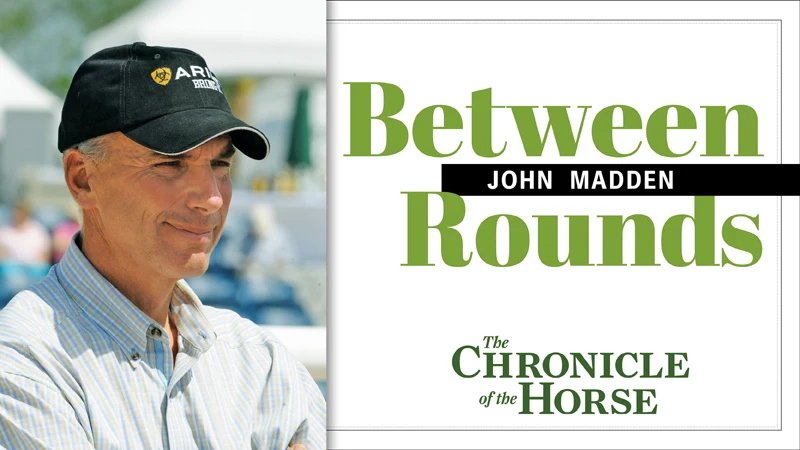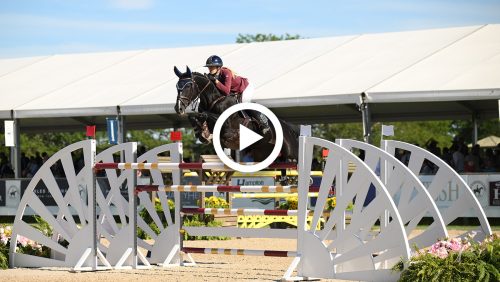Our columnist spent a week with George Morris helping to educate young riders and sees the future top tier strengthening.
I was honored to spend a week being part of the fourth annual George H. Morris Horsemastership Training Session in Wellington, Fla., Jan. 5-10. I’m extremely proud of what George’s idea has grown into in the past few years, and I feel it fills a void in our country that we’ve ignored for many years and perhaps even fostered.
The Horsemastership Session is a weeklong “camp” for 10 of the country’s top young riders. To be selected to participate in this prestigious event is quite the honor.
For the fourth year, we were able to keep this clinic free of charge for all riders and auditors, thanks to the support of Equestrian Sports Production, The Equus Foundation, The Syracuse Invitational, Practical Horseman magazine, The ASPCA, Adequan, The USET Foundation, the U.S. Equestrian Federation, the U.S. Hunter Jumper Association and Purina Mills.
Additionally, all of the clinicians teaching during the week continued the tradition of volunteering their time and services in the hopes of building a strong future of well-educated riders and trainers.
This year’s week included intensive riding sessions under the guidance of George Morris, but this was just the beginning of what the week offered. The real focus was to instill the idea that true horsemen and women are not just riders, but are also passionate in all aspects of their horse’s care.
They need to focus on perfecting systems for their barns in which the horse’s health and welfare is the top concern. With presentations throughout the week from Anne Kursinski, Dr. Tim Ober, Laurie Pitts, Dr. Mary Beth Gordon, Allyn Mann and ASPCA officials, the participants were given a wealth of knowledge to draw from in the future.
We have such strong junior riders in our country. We look at the 150 riders who came to Syracuse for the ASPCA Maclay Finals in 2009, and anyone would be impressed at the skill these riders have achieved. We look at the past Olympic Games and World Equestrian Games, and there’s no doubt we have fantastic, experienced top Olympians in our country.
With all of this quality, however, we still find a huge gap: the riders in their early to mid-20s are not stepping up and finding success as they need to be.
ADVERTISEMENT
Total Control
We had 10 of the top young riders in our country here last week: Chase Boggio, Zazou Hoffman, Matt Metell, Victoria Birdsall, Jessica Springsteen, Theo Boris, Jennifer Waxman, Reed Kessler, Jacqueline Lubrano and Christy DiStefano. All have had tremendous junior careers, are talented and seemed poised to join the ranks at the top tier of the sport.
Unfortunately, for our U.S. team, so many talented juniors hit this age and find themselves floundering when their junior days are over. We must acknowledge this weakness in our system and find a way to correct it.
Our barn manager for the week, Laurie Pitts, gave the week a focus for the riders: “Finding Your System.” It was the theme that permeated every morning in the barn, every lecture and lesson.
I think the failure of the current American system is on the students and teachers of today. For a rider to make that leap from success in the junior ranks to success as a professional, he must be prepared to make all the decisions in the care and control of his mounts.
The immense responsibility of total control in all facets from veterinary work, to feed, schedules and day-to-day care isn’t one today’s riders are necessarily well prepared for. Riders must find themselves hungry to know more; they must ask more questions. They must sit and watch the schooling ring, sit and watch classes they’re not competing in, ride different horses and even try different disciplines.
They must know how to groom their horses, know their equipment and its uses; they must educate themselves on proper nutrition, shoeing, deworming and veterinary care. Going hand-in-hand, trainers of today must be more willing to share their experiences with their students. The reasons behind the actions create the understanding so many are lacking.
Never Stop Asking Questions
As George said several times during the week: “I would take experience over knowledge any day.”
ADVERTISEMENT
This statement is a truth for all young horsemen. No one expects these riders making the leap to the next level to be perfect, and the quest to develop the right system for the rider and horse is, of course, never ending. The riders who left after this week will still find themselves with the daunting task of learning a great deal through trial and error.
The most important thing for these riders to have learned was that it is their responsibility as horsemen to ask the questions “Why? And how?” It’s their responsibility to be involved in every step of their mounts’ care and to ask the question “Why?” with every success and failure they meet.
Anne Kursinski spoke to riders and auditors about her journey as a young rider in her early 20s. As she said, what helped her become the horsewoman and competitor that she is today was constantly asking, “How can I be better?”
That simple question, “How can I be better?” is the key to a competitor’s success. Certainly, this factor applies to what happens in the ring, but, more importantly, what happens outside of the ring.
It’s my hope that these riders went home with a little more experience than they came with and a touch more wisdom to the fact that they have an infinite amount more to learn.
Between the support from all of those involved in this clinic, and especially George Morris, I feel we’re making a step in the right direction to educate the future top riders of our country and create a stronger top tier of riders. It’s these riders who will no doubt lead us to a future of Olympic medals, but, more importantly, a future with well-rounded horsemasters.
John Madden, Cazenovia, N.Y., is married to international grand prix rider Beezie Madden. Together, they operate John Madden Sales Inc., where they train horses and riders. The horse business has encompassed John’s entire life, and in addition to his business he’s the Organizing Committee Chairman for the Syracuse Sporthorse Tournament (N.Y.) and on the USEF High Performance Show Jumping Computer List Task Force. He began contributing to Between Rounds in 2008.
If you enjoyed this article and would like to read more like it, consider subscribing. “We’re Working Hard To Fill A Void In Our System” ran in the January 10, 2010 issue. Check out the table of contents to see what great stories are in the magazine this week.















